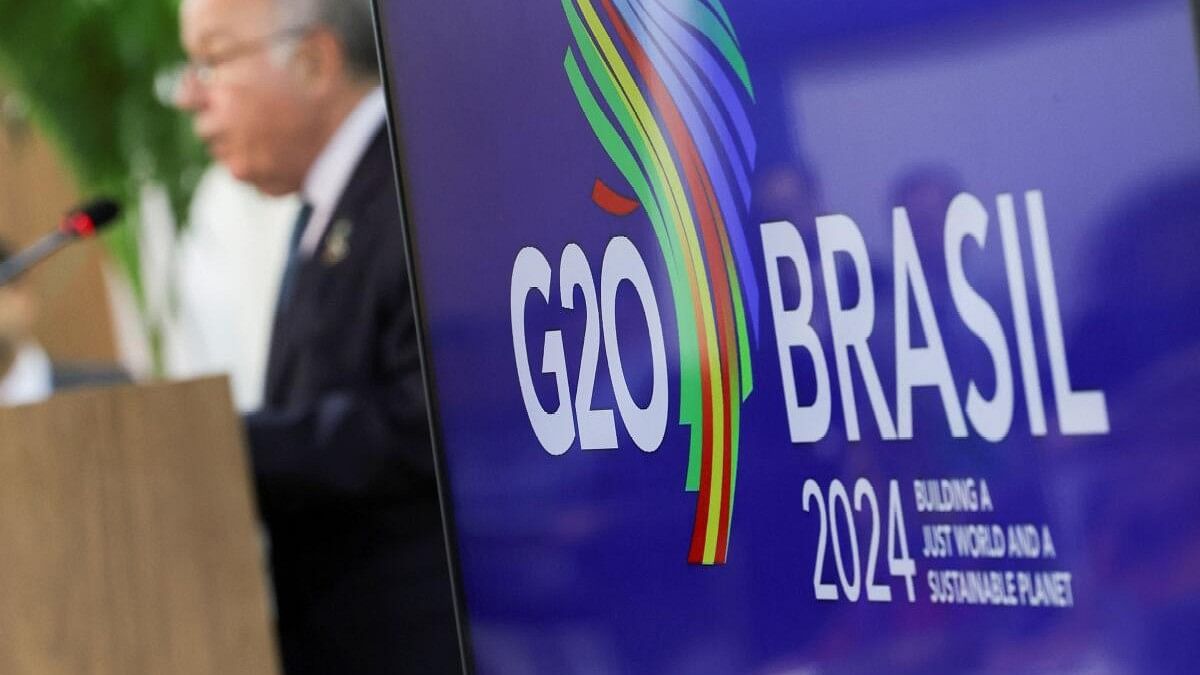
A logo of G20 is displayed as Brazilian Foreign Minister Mauro Vieira speaks during a press conference following the G20 Foreign Ministers' Meeting, in Rio de Janeiro.
Credit: Reuters Photo
Sao Paolo/Brasilia/Tokyo: With their countries deeply divided over Israel's attacks on Gaza, finance officials from the Group of 20 major economies are poised to set aside geopolitics and focus on global economic issues when they meet in Sao Paulo, Brazil this week.
Brazil, keen to ensure a productive session that delivers consensus on key economic priorities, has proposed a much shorter closing statement than seen in recent years - a move already negotiated with other members, according to a Brazilian government source and a second source familiar with the draft.
The South American country is the current G20 president.
The latest draft, still being finalized, mentions the risks of global fragmentation and conflicts in general terms but omits any direct reference to Russia's invasion of Ukraine or the Israel-Gaza war, the sources said.
Finance officials and central bankers from the U.S., China, Russia and the world's other largest economies will meet in Sao Paulo to review global economic developments at a time of slowing growth, the growing strains of record debt burdens, and worries that inflation may not yet be tamed, which are keeping interest rates high.
The International Monetary Fund last month said the chance of a "soft landing" in which inflation falls without triggering a painful global recession had increased, but warned that overall growth and global trade remained lower than the historical average.
Russia's invasion of Ukraine almost exactly two years ago roiled the G20, exposing long-simmering fault lines within the group and thwarting efforts by G20 officials to reach consensus on a final statement, or communique, after their meetings.
India and Indonesia, which held the G20 presidency before Brazil, opted for chair statements summarizing areas of agreement and noting dissenting voices - namely Russia - but even that could prove difficult given the bitter divisions over the four-month war in Gaza. The war erupted when the ministers last met in Marrakech, Morocco in October, intensifying divisions between the United States and its Western allies, and non-Western countries in the G20.
Brazil, Saudi Arabia and South Africa have been outspoken critics of Israel's relentless assault on Gaza since the Oct. 7 surprise attack in which Palestinian Islamist group Hamas killed around 1,200 people and seized 253 hostages, one G7 source said. The retaliatory attacks have killed more than 29,000 Palestinians, according to the Gaza health ministry.
The U.S., meanwhile, last week vetoed a draft United Nations Security Council resolution on the Israel-Hamas war, blocking a demand for an immediate humanitarian ceasefire and pushing instead for a temporary ceasefire linked to the release of the remaining hostages held by Hamas.
The deep differences over Gaza necessitated a different approach this year, the Brazilian official said, adding, "If the topic is included, there will be no consensus."
To prevent differences over Gaza from derailing progress on economic issues, Brazil proposed a shorter statement with no specific mention of either war. Washington argued against language holding Israel accountable, which South Africa and others had argued was needed if the statement mentioned and condemned Russia's war against Ukraine, a G7 source said.
'BROADER ETHOS'
Brazil wants to focus this week's discussions on ending inequality, reforming international taxation, addressing sovereign debt distress and working toward sustainable development. Reforms of multilateral banks and climate finance will feature more prominently at the spring meetings of the IMF and World Bank in Washington in April, the Brazilian source said.
Mark Sobel, the US chair of the Official Monetary and Financial Institutions Forum (OMFIF), said stripping geopolitics from the communique made sense for a group that had historically focused on economic and financial issues.
"Yes, it reflects fractiousness, but it also reflects this broader ethos of the finance ministers and central bankers to focus on economic and financial matters in a technical way," he said.
One G7 official said the statement would likely be "concise and ambiguous, only mentioning issues where there's no contention."
US Treasury Secretary Janet Yellen plans to underscore the importance of the G20 body, highlighting collaborative efforts to address global challenges such as sovereign debt and the COVID-19 pandemic, a senior US official said.
Yellen will meet with Brazilian Finance Minister Fernando Haddad to celebrate 200 years of US-Brazil relations, an event the Brazilian official said was designed to highlight the South American country's "interest in not embracing a divisive approach, but focusing on constructive efforts."
One unresolved issue is to what extent the U.S., Japan and Canada will prevail in demanding a mention of the economic impacts of geopolitical conflicts in the communique, the first Brazilian official said.
But the failure of G20 foreign ministers to include the issue sent a strong signal, the official said.
"The outcome of the sherpas meeting strengthens our understanding that the topic (of geopolitics) should not be included in the communique."
Eric Pelofsky, a former senior US official now with the Rockefeller Foundation, said there was value in meeting in configurations like the G20, despite clear differences.
"Sometimes talking without success is still talking. Maybe that means that at the end of the day, somebody has a coffee that they weren't supposed to have and they find a bit of common ground that they weren't supposed to know existed."